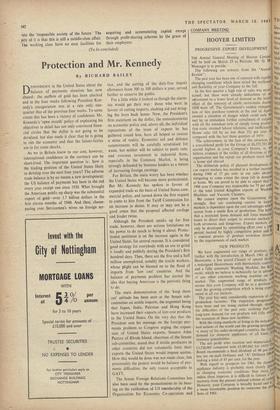Protection and Mr. Kennedy
By RICHARD BAILEY DESPONDENCY in the United States about the balance of payments situation has now abated: the outflow of gold has been checked and in the four weeks following President Ken- nedy's inauguration was at a rate only one- quarter that of the previous four weeks. To some extent this has been a victory of confidence. Mr. Kennedy's 'open mouth' policy of explaining his objectives in detail has not only convinced finan- cial circles that the dollar is not going to be devalued, but also made it clear that he is going to run the economy and that the laisser-fairies are in for some shocks.
As we in Britain know to our cost, however, international confidence in the currency can be short-lived. The important question is: how is the trading position of the United States likely to develop over the next four years? The adverse trade balance is by no means a new development; the US balance of payments has been in the red every year except one since 1950. What brought the American public up sharp was the substantial export of gold—over 1.7 billion dollars in the first eleven months of 1960. And then, cheese- paring over Servicemen's wives on foreign ser- vice, and the cutting of the duty-free import allowance from 500 to 100 dollars a year, served further to unnerve the public.
For a little while it looked as though the alarm- ists would get their way: those who were in favour of cutting imports, slashing aid and bring- ing the boys back home. Now, the President's firm statement on the dollar, the announcements on economic policy and, above all, the individual reputations of the team of experts he has gathered round him, have all helped to restore a sense of reality. Economic aid and defence commitments will be carefully scrutinised for waste, but neither will be subject to panic cuts; and overseas investment in industrial firms, especially in the Common Market, is being strongly defended by business leaders as a means of increasing foreign earnings.
For Britain, the main worry has been whether the United States will become more protectionist. But Mr. Kennedy has spoken in favour of expanded trade as the basis of United States com- mercial policy, and turned down the first request to come to him from the Tariff Commission for an increase in duties. It may or may not be a good omen that the proposal affected cordage and binder twine.
Although the President speaks up for free trade, however, there are serious limitations on his power to do much to bring it about. Protec- tionist sentiment is on the increase again in the United States, for several reasons. It is considered good strategy for everybody with an axe to grind it loudly and publicly during the President's first hundred days. Then, there are the five and a half million unemployed, notably the textile workers, whose plight can be blamed on to the flood of imports from 'low cost' countries. And the balance of payments problem has started the idea that buying American is the patriotic thing to do.
The main demonstration of the 'keep them out' attitude has been seen at the Senate sub- committee on textile imports, the argument being that Japan, India, Pakistan and Hong Kong have increased their exports of low-cost products to the United States. On the very day that the President sent his message on the foreign pay- ments problem to Congress urging the expan- sion of United States exports, Senator John Pastore of Rhode Island, chairman of the Senate sub-committee, stated that if textile producers in other countries did not voluntarily limit their exports the United States would impose quotas. How this would be done was not made clear, but presumably the pretext would be balance of pay- ments difficulties, the only reason acceptable to GATT.
The Senate Foreign Relations Committee has also been used by the protectionists in its hear- ing on the ratification of US membership of the Organisation for Economic Co-operation and new body will have the eighteen former OEEC Countries plus the US and Canada as full mem- bers; it is designed to provide a forum for the discussion of economic and monetary problems, and the co-ordination of policies for aid to the underdeveloped countries. OECD has no power to raise or lower tariffs; yet witnesses appearing before the Committee argued that ratification ssould amount to a Congressional surrender, to the State Department, of authority over tariff regulations—in spite of the fact that both Dean kusk and Douglas Dillon assured them that °ECD had nothing at all to do with tariffs. There seems little doubt that the convention will be ratified, but the behaviour of the protectionist group—which crosses party lines—shows that there will be strong resistance to any tampering with the limitations on the President's powers.
These limitations represent a weakness in Mr. Kennedy's position. Under the Reciprocal Trade Agreements Act, which has to be re- gotiated next year, he is able to reduce tariffs in annual stages by not more than 20 per cent. ?f the rates applying on July 1, 1958. This power
hedged around by the need to consult interests affected and, in particular, to have the views of flle Tariff Commission on the 'peril point' clauses. 4.1loy American economists and businessmen Want to see the United States taking a lead in !teeing trade throughout the world. But the real- ists insist that new tariff legislation in place of dte Reciprocal Trade Agreements Act will be an essential first step. And for this to be effective "'C President will have to be given greater free- 0111 of action. So far Mr. Kennedy has not ,ii"nounced on this question, but there can be no "'Ott that it is on the list of things to be done.







































 Previous page
Previous page